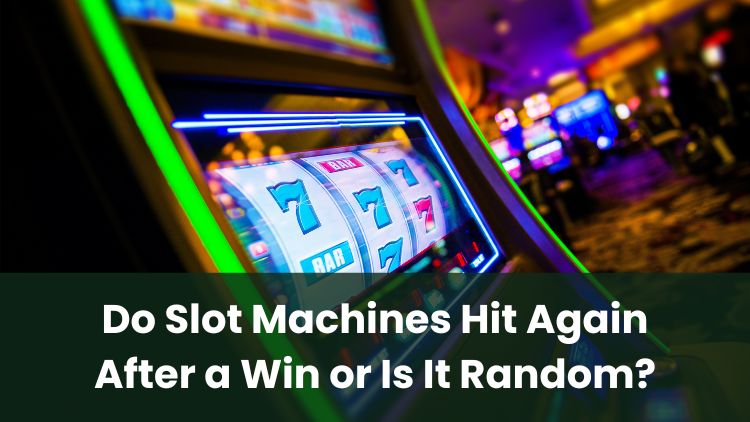
You might have wondered whether a slot is more likely to pay out again right after a win. Some people may notice “patterns” or streaks, while others say it is purely unpredictable.
This article explains how slots actually work in the UK and why certain beliefs keep appearing.
We will look at what is happening behind the reels, the systems that power results, and how features like volatility and RTP (Return to Player) fit into the picture. By the end, you should have a clearer view of what might happen when you press spin.
What Actually Happens When a Slot Machine Pays Out?
When you spin a slot, a computer programme called a Random Number Generator (RNG) decides the outcome. It selects numbers that correspond to positions on each reel, which is why the symbols you see land where they do.
A payout occurs if those symbols form a combination shown on the game’s paytable. The paytable lists which patterns can return winnings and how each one is valued.
Each spin stands on its own. The result is not affected by what happened before, whether that was a win, a loss, or a long quiet spell.
You might see details like the RTP and volatility on the game info screen. We cover RTP later, but both exist to explain how a slot may behave over time, rather than to predict any single spin.
Understanding How Slot Machine RNGs Work
A Random Number Generator, or RNG, is the core system that produces outcomes for every spin. It runs continuously, cycling through vast sequences many times per second. The instant you press spin, it takes a snapshot from that sequence and maps it to the reels. That mapping decides where the reels stop.
Because the RNG does not store past results, it cannot adjust for what just happened. There is no memory and no balancing of wins and losses from one spin to the next. Timing tricks, pausing, or changing the pace of play do not influence the outcome, as the selection is made the moment the spin command is received.
In the UK, online slots must use RNGs tested by independent laboratories to confirm they operate fairly. Regulators require this, so that neither the operator nor the player can manipulate results. The outcome of one spin has no bearing on the next, which is why sequences can sometimes look streaky, even when they are behaving exactly as designed.
Is Each Slot Spin Really Independent?
Yes. Independence means the probability of any result does not move up or down because of what came before. A run of losses does not make a potential win more or less likely, and a quiet patch does not mean a game is building towards a payout. Those patterns are a normal part of random outcomes, rather than signals that a change is due.
Different slot titles have their own reel layouts, features, and paytables. It can be worth checking the game info so you know which symbol combinations matter and how any bonus features trigger. That context can help you understand what you are seeing without reading meaning into any previous spins.
Will a Slot Machine Hit Again If It Hits?
It can, but not because the earlier win has nudged the next result. Consecutive wins may happen naturally when two independent spins both land on winning combinations. You can also see the reverse: long stretches without a win. Neither pattern signals anything about what comes next.
Volatility plays a role in how this feels. Higher volatility games tend to return winnings less often, but may offer larger prizes if they do. Lower volatility titles usually offer smaller and potentially more frequent payouts. These are broad tendencies built into the maths of the game. They describe the overall profile, rather than predicting your next spin and do not guarantee any winnings.
This leads neatly to RTP, which is another figure you will see on most slot info screens.
What Is RTP In Slots?
RTP stands for Return to Player. It is shown as a percentage, such as 96%, and it describes the proportion of stakes a game is designed to pay back on average over a very large number of spins. For example, a 96% RTP suggests that, across millions of spins, a slot may return £96 for every £100 wagered in total.
The RTP is a theoretical measure based on extensive testing before release. Individual sessions will vary above and below that percentage, sometimes by a wide margin, because each spin is still decided by the RNG.
Volatility and features like multipliers, free spins, and expanding symbols can change how any potential winnings might appear along the way, even when the long-term RTP remains the same.
Play Slots Online at Clover Casino
If you are interested in exploring more slot games, Clover Casino offers a range of real money titles with different themes, features, and paytables.
Our site is licensed and regulated by the UK Gambling Commission (UKGC), and games are tested to meet required fairness standards.
Log in or join Clover Casino to browse our collection and check each game’s paytable and rules before you play. Clear game info makes it easier to choose the style that suits how you prefer to play.
Outcomes cannot be predicted and there is always risk. Set sensible limits, keep track of your sessions, and only stake what you can afford.
*All values (Bet Levels, Maximum Wins etc.) mentioned in relation to these slot games are subject to change at any time. Game features mentioned may not be available in some jurisdictions.
**The information provided in this blog is intended for educational purposes and should not be construed as betting advice or a guarantee of success. Always gamble responsibly.
